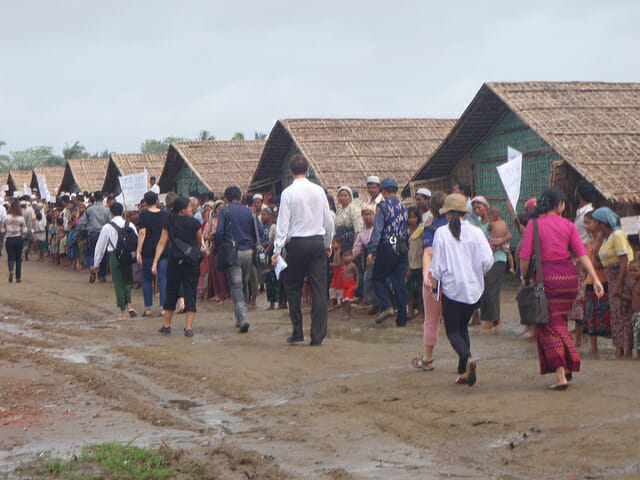Myanmar Military Used Facebook to Incite Violence Against the Rohingya
Ethnic cleansing against a minority group was helped by social media. A displaced persons camp for Rohingya in Myanmar's Rakhine state. (Bernard Jaspers-Fajer / EU/ECHO /Flickr Creative Commons).
A displaced persons camp for Rohingya in Myanmar's Rakhine state. (Bernard Jaspers-Fajer / EU/ECHO /Flickr Creative Commons).
The social network we use to share cat photos and reports of new babies is also a breeding ground for disinformation campaigns. As Americans continue to argue over whether posts from Russian-affiliated groups influenced the outcome of the 2016 U.S. election, an investigative report by The New York Times reveals the Myanmar (formerly Burma) military “turned the social network into a tool for ethnic cleansing, according to former military officials, researchers and civilian officials in the country.”
Since August 2017, nearly 700,000 Rohingya, a Muslim minority group in majority-Buddhist Myanmar, have fled the country, mainly to Bangladesh, the BBC reported in April. The exodus started when the Myanmar government began retaliating for militants’ attacks on police posts. At least 6,700 Rohingya were killed in the first month of the military-directed violence, Doctors Without Borders reported.
However, as the Times points out, anti-Rohingya social media campaigns started years before 2017. Facebook users who attracted followers by claiming to be fans of Burmese pop stars and other celebrities described Islam as a threat to Buddhism all over the world or told unsubstantiated stories about Muslims raping Buddhist women.
The military, Paul Mozur writes in the Times, “exploited Facebook’s wide reach in Myanmar, where it is so broadly used that many of the country’s 18 million internet users confuse the Silicon Valley social media platform with the internet. Human rights groups blame the anti-Rohingya propaganda for inciting murders, rapes and the largest forced human migration in recent history.”
Facebook may have taken down the official accounts of Myanmar’s military leaders, but that doesn’t stop the unofficial accounts that provide much of the support for the disinformation. Mozur continues:
The campaign, described by five people who asked for anonymity because they feared for their safety, included hundreds of military personnel who created troll accounts and news and celebrity pages on Facebook and then flooded them with incendiary comments and posts timed for peak viewership. Working in shifts out of bases clustered in foothills near the capital of Naypyidaw, officers were also tasked with collecting intelligence on popular accounts and criticizing posts unfavorable to the military, the people said. So secretive were the operations that all but top leaders had to check their phones at the door.
Those behind the efforts spread explicit photos and fake news, much of it anti-Muslim. Sometimes they even showed photos of corpses they claimed were Buddhists killed by Rohingya.
These actions, Mozur says, “are among the first examples of an authoritarian government using the social network against its own people.”
Many of the sources for the article remained anonymous. One who didn’t, Thet Swe Win, founder of Synergy, an organization that focuses on promoting social harmony in Myanmar, said, “I wouldn’t say Facebook is directly involved in the ethnic cleansing, but there is a responsibility they had to take proper actions to avoid becoming an instigator of genocide.”
The campaign in Myanmar even used some of the tactics employed by those who spread Russian disinformation. As Mozur reports, “Three people familiar with the situation said some officers had studied psychological warfare, hacking and other computer skills in Russia. Some would give lectures to pass along the information when they returned, one person said.”
For Facebook’s part, company officers did confirm many of these details to the Times. Nathaniel Gleicher, Facebook’s head of cybersecurity, said the company found “clear and deliberate attempts to covertly spread propaganda that were directly linked to the Myanmar military.”
After receiving questions from the Times, Facebook took down a number of accounts, with a total of 1.3 million followers, that posed as entertainment accounts but were actually connected to the military.
Read the entire report here.
Your support matters…Independent journalism is under threat and overshadowed by heavily funded mainstream media.
You can help level the playing field. Become a member.
Your tax-deductible contribution keeps us digging beneath the headlines to give you thought-provoking, investigative reporting and analysis that unearths what's really happening- without compromise.
Give today to support our courageous, independent journalists.








You need to be a supporter to comment.
There are currently no responses to this article.
Be the first to respond.